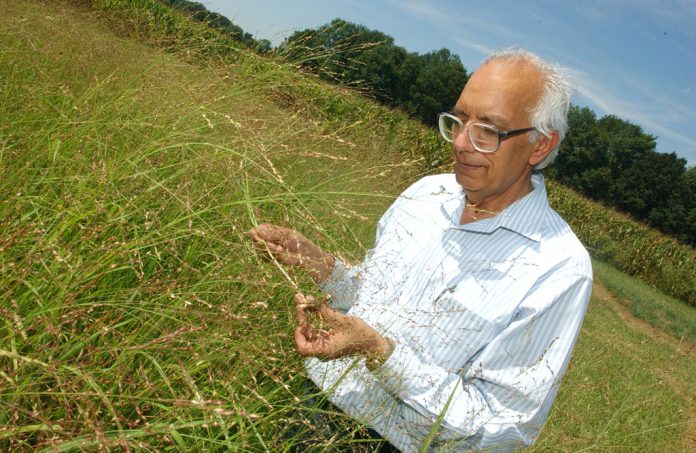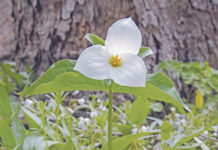
COLUMBUS — Rattan Lal, one of the most decorated professors to teach and conduct research at The Ohio State University, will receive the 2020 World Food Prize Oct. 15, during the virtual Borlaug Dialogue streaming from Des Moines, Iowa. That same day, he will also be honored by Ohio State in a virtual ceremony to honor his legacy.
The renowned soil scientist and distinguished university professor in the College of Food, Agricultural, and Environmental Sciences was named recipient of the 50th World Food Prize in June.
The World Food Prize Laureate Award Ceremony is set for 10-11 a.m. Oct. 15 and can be viewed atworldfoodprize.org/live. The prize includes a $250,000 cash award and a sculpture by noted artist and designer, Saul Bass.
Ohio recognition
Later that day, friends and colleagues from Ohio State and around the world are invited to honor the 76-year-old Lal’s legacy by participating in a virtual side event hosted by the College of Food, Agricultural and Environmental Sciences. Registration is required at go.osu.edu/Bxqr to participate in Ohio State’s ceremony beginning at 2 p.m. Oct. 15.
This event will include an overview of Lal’s work from his humble beginnings as a refugee growing up on a small subsistence farm in India, to becoming a world-renowned scientist and World Food Prize laureate. A guided discussion and reflection with Lal will be featured, as well as the announcement of upcoming CFAES and Ohio State plans that will contribute even more to his legacy.
Borlaug Dialogue
In 1986, Norman Borlaug, who is known for sparking what is today called the Green Revolution, founded The World Food Prize, often referred to as the “Nobel Prize for Food and Agriculture,” to both highlight and inspire breakthrough achievements in improving the quality, quantity, and availability of food in the world.
He also helped build the World Food Prize’s Borlaug Dialogue, an international symposium that annually brings together over 1,200 people from more than 65 countries to address cutting-edge issues in hunger and food security. Due to COVID-19, the 2020 three-day conference, set for Oct. 12-16, will be held virtually through a series of live video sessions and discussion forums. Lal will join Al Gore, former U.S. vice president, to kick off the opening session titled Translating Climate Science to Action from 10-11 a.m. Oct. 12.
They will examine the emergence of carbon positive agriculture and negative emission technologies, as well as the policy actions needed to further elevate soil health as a critical innovation.
The Ohio State professor will also be one of eight speakers in a roundtable discussion of Carbon Sequestration, Sustainability in Agriculture, and the Rise of Carbon Markets from 11 a.m.-12:30 p.m. Oct. 12. The group will consider carbon market models and applications of carbon payment systems globally to explore the potential of carbon markets to drive innovations toward climate-positive agriculture.
Career
Lal first came to Ohio State to work on his doctorate in soil science, which he completed in 1968. After working with farmers in Asia, Africa and Latin America, he returned to the university in 1987, and, 10 years later, co-wrote the first documented scientific report showing how restoring degraded soil could also defend against rising levels of carbon dioxide in the air. This breakthrough research transformed the way the world saw soils.
Much of Lal’s work has looked at carbon sequestration in agriculture and removing atmospheric carbon for the long-term, mitigating global warming and pollution effects. In 2000, he established the Carbon Management and Sequestration Center at Ohio State. Lal has received multiple international awards over the years.
Awards
In 2019, he became the first Ohio State scientist and the first soil scientist to ever receive the Japan Prize. In 2020, he not only won the World Food Prize, but also received the Canadian-based Arrell Global Food Innovation Award. He’s received numerous other awards, including the Glinka World Soil Prize, the World Agriculture Prize from the Global Confederation of Higher Education Associations for the Agricultural and Life Sciences, the Liebig Award, the Swaminathan Award for Environment Protection and the Norman Borlaug Award.
A faculty member at Ohio State for 33 years, he was listed by Thomson Reuters as among the top 1% of most-cited scientists in agriculture for 2014-2019 and among the world’s most influential scientific minds in 2015. Lal was recognized for his contributions to the Intergovernmental Panel on Climate Change, which shared the 2007 Nobel Peace Prize with Gore.










